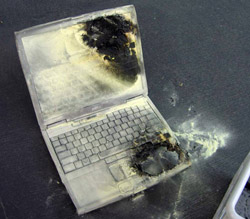
The News Corp. phone-hacking scandal continues to spiral out of control, sweeping up more and more of the companies employees and executives. In the UK, 8 people were arrested, including five News Corp journalists, in the broadening scandal, which may embroil deputy COO James Murdoch—Rupert’s son and heir-apparent. A paper copy of a deleted email found in a crate ties James Murdoch directly to the events under investigation, which involved the routine and illegal hacking of phone voicemails on behalf of a News Corp publication.
This email evidence would never have been found if it wasn’t printed out because News Corp, like many corporations, regularly deletes archived emails. It is standard practice, but the technical reasons given for deleting emails are usually not the real reason they are eliminated. The only real reason to destroy old emails is to avoid liability and future lawsuits.
Reading the account in the New York Times about this newly discovered email from former News of the World editor Colin Myler to James Murdoch, which dates back to 2008, you get a sense it wasn’t meant to be found.
Let’s just be clear here. By putting in place policies to routinely delete old email archives, companies are protecting themselves from future incrimination. And News Corp isn’t the only company that does this, by any means. It’s a preventative measure. But it only works if they destroy any incriminating emails before they are caught. Once an investigation starts and the prospect of subpoenas arise, destroying emails is no longer a legal option. In this case, that may come back to bite News Corp.
Source:http://techcrunch.com/2012/02/12/the-only-reason-companies-delete-emails-is-to-destroy-evidence/
This email evidence would never have been found if it wasn’t printed out because News Corp, like many corporations, regularly deletes archived emails. It is standard practice, but the technical reasons given for deleting emails are usually not the real reason they are eliminated. The only real reason to destroy old emails is to avoid liability and future lawsuits.
Reading the account in the New York Times about this newly discovered email from former News of the World editor Colin Myler to James Murdoch, which dates back to 2008, you get a sense it wasn’t meant to be found.
Mr. Myler’s electronic copy had been lost “in a hardware failure” on March 18, 2010,” while Mr. Murdoch’s electronic copy had been deleted on Jan. 15, 2011 during an “e-mail stabilization and modernization program.”Companies know that incriminating evidence always exists in emails because emails document the conversations and decision-making that goes on in all organizations. But they need a justification other than “We don’t want to get caught.” So that’s how you get corporate doublespeak like “e-mail stabilization and modernization” programs, with its vague suggestion that there is a technical reason to delete old emails, as if a company’s entire email system might crash under the weight of old emails stored on a server.
Big corporations routinely delete old e-mails. Between April 2010 and July 2011, News International discussed e-mail deletion with HCL Technologies, which manages its e-mail system, on nine occasions, according to a letter HCL wrote to Parliament last summer.
Most of the reasons were mundane. But in January 2011, HCL said, News International asked whether HCL was capable of helping “truncate” — meaning delete — “a particular database” in the e-mail system. The question came shortly after disclosures in a civil suit brought by the actress Sienna Miller raised fears that material about widespread phone hacking at The News of the World might become public.
Let’s just be clear here. By putting in place policies to routinely delete old email archives, companies are protecting themselves from future incrimination. And News Corp isn’t the only company that does this, by any means. It’s a preventative measure. But it only works if they destroy any incriminating emails before they are caught. Once an investigation starts and the prospect of subpoenas arise, destroying emails is no longer a legal option. In this case, that may come back to bite News Corp.
Source:http://techcrunch.com/2012/02/12/the-only-reason-companies-delete-emails-is-to-destroy-evidence/

No comments:
Post a Comment